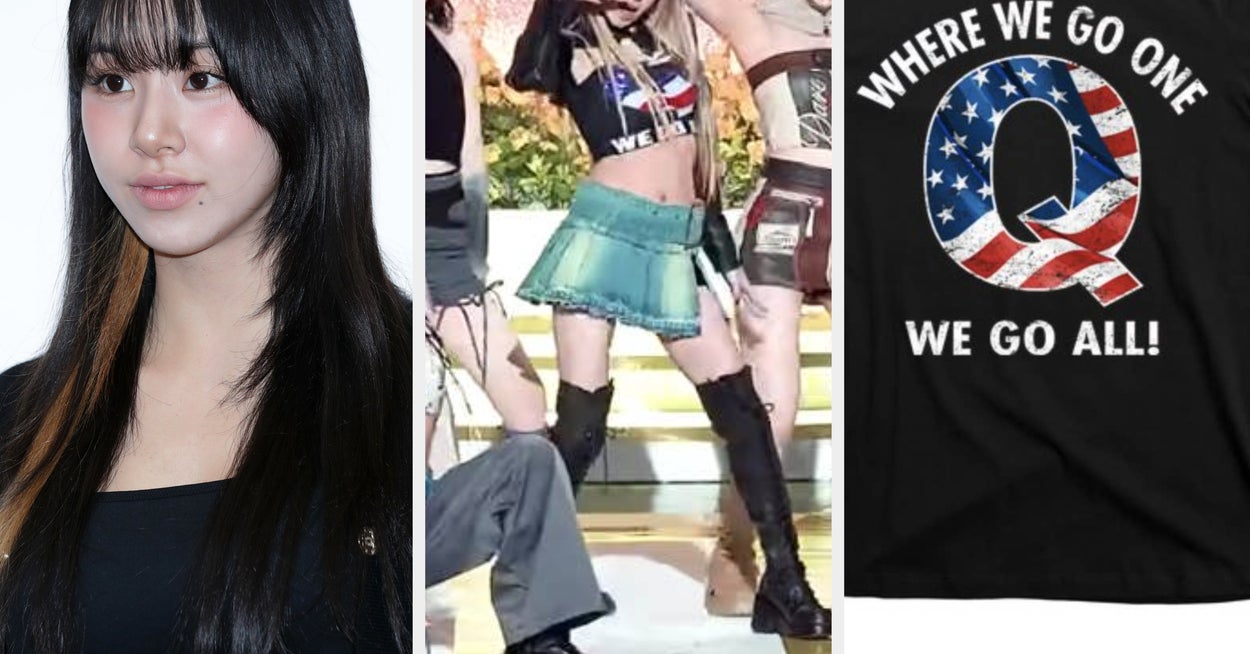In the dynamic and often visually driven world of K-pop, the aesthetics of what idols wear can sometimes lead to controversial outcomes. One recent incident that has sparked widespread reaction involves K-pop idol Chaeyoung from the popular group TWICE. Fans were taken aback when Chaeyoung was seen wearing clothing with sensitive and highly inappropriate symbols and messages, leading to a significant backlash on various social media platforms.
The first instance of controversial attire included a T-shirt with a slogan that appeared to reference QAnon, a baseless conspiracy theory. Fans were quick to discuss their shock and dismay upon noticing the T-shirt, not just because of the nature of the reference but also because of the broader implications it might have on the idol’s image. One fan expressed their bewilderment on Reddit, sarcastically questioning Chaeyoung’s whereabouts during the notorious January 6th Capitol riot in the United States, linking her attire to the event in a concerned yet mocking tone. This highlighted the significant disconnect sometimes present between the fashion choices made by stylists and the cultural or political understanding associated with those choices.
Another profoundly troubling incident involved Chaeyoung wearing a T-shirt that carried the design of a swastika. The symbol, widely recognized for its association with Nazi Germany and the atrocities of World War II, understandably drew severe criticism from fans and observers worldwide. Disturbingly, this was not an isolated appearance—Chaeyoung had apparently worn the T-shirt in another Instagram post earlier in the month, indicating a recurring issue rather than a one-off mistake.
The oversight regarding the T-shirt designs was met with a formal apology from JYP Entertainment, TWICE’s managing agency. In their statement, JYP Entertainment expressed deep regret for not thoroughly vetting the clothing items before they were worn publicly. The agency acknowledged full responsibility for the oversight, emphasizing their commitment to ensuring such errors do not happen in the future. They recognized the gravity of the situation and the potential harm it could cause, not only to the idol involved but to the reputation of the agency and its other artists.
This incident sheds light on several critical issues within the entertainment industry, especially within the sphere of K-pop. First, there is the considerable influence and power stylists and other behind-the-scenes professionals hold over the public images of idols. Their choices can make or break public perceptions and can have unintended consequences if not carefully considered. Moreover, given the international fanbase that K-pop groups like TWICE enjoy, the cultural and historical knowledge and sensitivities are essential criteria that stylists and agencies must keep in mind while making decisions about public appearances and attire.
Secondly, incidents like these open a broader dialogue about the need for culturally sensitive education and awareness among all members of the production and management teams in entertainment companies. As global icons, K-pop idols often bridge diverse cultures, and their influence is vast. It’s imperative, therefore, that the teams supporting these idols are well-versed in global cultural symbols and narratives to avoid similar public relations crises, which can tarnish an idol’s career and negatively impact a group’s standing and reception on the world stage.
Finally, from a fan’s perspective, these issues highlight the importance of holding public figures and their management to account, ensuring that they adhere to respectful and informed practices. It’s a call to the fans and the public to continue scrutinizing and providing feedback on the actions and decisions of public figures and their management, fostering a more informed and culturally sensitive entertainment environment.
Overall, while this incident has certainly cast a shadow over the usually bright and energetic image of TWICE, it serves as a crucial learning moment for the K-pop industry. It underscores the importance of sensitivity, awareness, and responsibility in every aspect of celebrity management and representation. Moving forward, one can hope this will lead to more thoughtful and informed decisions that respect and acknowledge the diverse cultural contexts in which these global idols operate.









